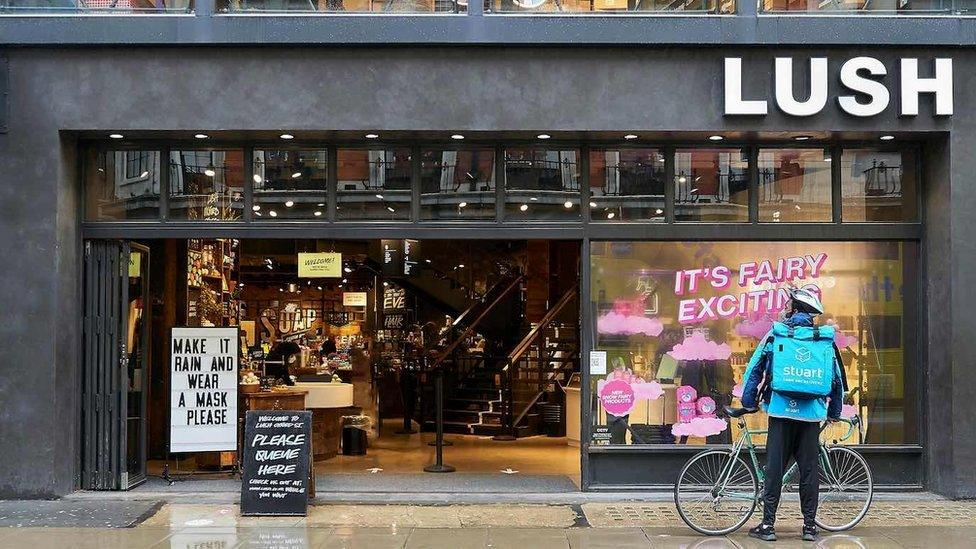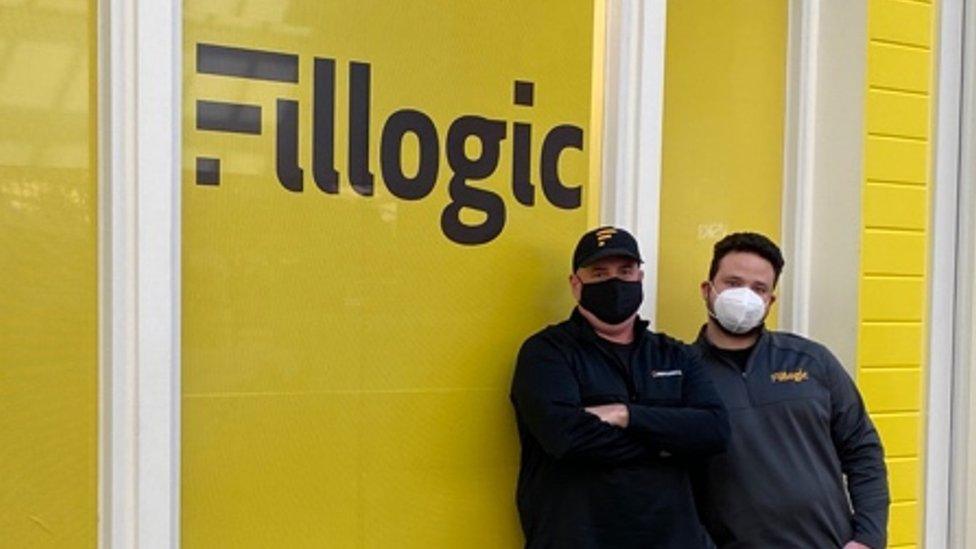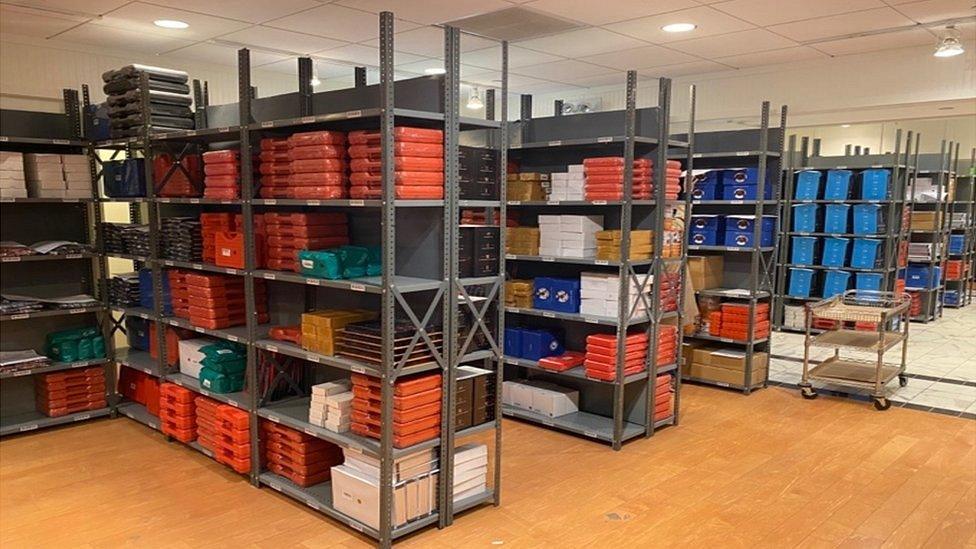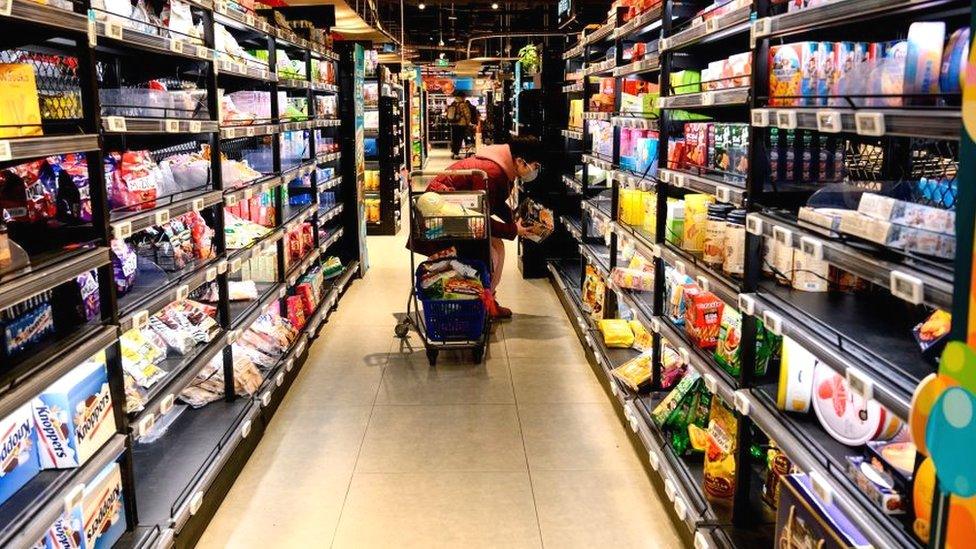Why shops are going over to the 'dark' side
- Published

Lockdowns have been a savage blow to many High Street retailers
When the first lockdown hit, Fiona Jamieson and her manager Sergio Mastrodonato wondered what to do about all the beautiful soap sitting untouched in Lush's flagship Oxford Street store.
A rush of online orders flooded the website the moment physical shops closed, but demand was so heavy that the site had to be taken offline temporarily.
Desperate not to waste three floors worth of the cosmetics, the pair considered buying a van.
"Then we remembered that neither of us drive," laughs Ms Jamieson, who is head of people and organisation development at Lush Oxford Street.
It was a watershed moment, she recalls: "We had all this retail space and it was full of fresh product."
They could not return it to the manufacturing centre, which was too busy with the backlog of online requests.
So why not turn the shop into a local distribution centre?
The pair called their new bike and on-foot delivery service Lush Local. It served customers they found on social media and loyal shoppers they knew of who lived in the area.

Fiona Jamieson, one of the creators of Lush Local
Payments were taken through the customer care team. Orders were packed onsite.
Subsequently, the entire company adopted the model and Lush Local was rolled out across 45 shops in the UK.
By creating a pop-up e-commerce centre, Lush transformed its High Street stores into "dark stores" - retail outlets that cater exclusively for online shopping.
Lush stores will reopen on Wednesday when England comes out of its second lockdown but the company has no plans to pack up its shipping stations. While customers browse soap in the front of the shop, staff will also pack and deliver to online clientele from "the back of the house".
Ms Jamieson says the company's aim is to reach its customers "in a way that works best for them".
Facilities to process, pack and dispatch customer orders (often called fulfilment centres) are currently the most sought-after type of commercial property in the UK.
Online shopping surged during the worst of the Covid-19 pandemic earlier this year. In the US, government figures show e-commerce jumped 44% in the second quarter, compared to the previous year. In the UK, research company GlobalData puts the increase at 50%.


A record number of big warehouses were rented this quarter, according to a report by real estate services and investment group CBRE.
"It is a case of more clicks and less bricks," says Andrew Jones, chief executive of property developer LondonMetric.
Mr Jones has a property portfolio made up of almost 70% of buildings that house logistics and distribution operations.
He would very much like to acquire more of this kind of real estate, he says, but prices have soared.
Tenants like Amazon and Argos, who are players at the forefront of e-commerce, pay all of their rent and they pay it on time.
The same cannot be said for many stores on London's Oxford Street, which have signed agreements to negotiate down rent prices by between 40-50%, he says.
"My job is to keep the rents flowing. But in the last 10-15 years, we have had a reset. In physical retail, it's not pretty," says Mr Jones.
The boom in huge warehouses dotting the outskirts of London has inspired others to recreate the same kind of business model, but in smaller spaces.

Bill Thayer and Rob Caucci are buying up disused stores in US shopping centres
Bill Thayer has spent the last 35 years in retail logistics and online operations.
Now he run his own firm, Fillogic, with business partner Rob Caucci. They rent disused stores in US shopping centres to create mini warehouses and distribution centres.
Fillogic works with retailers and online brands that want to package and send items from its stores. Its hubs offer same-day delivery, can quickly restock items in the customer-facing stores and also handle customer returns.
As tough economic conditions have chased better-known brands from these centres, Fillogic has been able to pick up larger and more affordable spaces.
"One man's trash is another man's treasure," says Mr Thayer, who has partnered with 450 US shopping centres. He is in talks to move into two spaces in the UK and a few in South America and Australia.
In the global pandemic, demand for his business has skyrocketed.
"All the logistics networks are broken. There are just not enough people out there," he says.

Fillogic turns stores into distribution hubs
Overburdened courier services like the US Postal Service prioritise pick-ups from huge warehouses, he says.
But retailers still need to ship products from their stores. Fillogic has filled the gap.
"Physical retail is in transformation," says Mr Thayer.
"Dark stores are emerging. It's a global trend accelerated by Covid-19," agrees Simon Mardle, an expert in digital supply chains at the consultancy firm Capgemini.
In the first lockdown, grocery businesses like Walmart in the US and Tesco in the UK raced to scale up both online and delivery services to serve those stuck at home.
These operations will become more automated, Mr Mardle thinks, as the journey from the shelf to the customer becomes an online phenomenon.
If e-commerce takes over, that leaves a lot of shops on expensive real estate without a role. But Mr Mardle thinks they will serve a new purpose.
Instead of going to the shop expecting to leave with things in a bag, retailers will make it more of an experience and a way to try out items that might be delivered to you at a later date.
We've started down this road already, he says.
"Think of Apple [stores] where people spend time to get to know the brand and the product there," says Mr Mardle.

Retailers like China's Hema are investing in technology
In China, grocery shopping has already become more like playing with iPads in an electronic store, he points out.
Hema supermarkets, which are owned by the Chinese e-commerce giant Alibaba, have some items for sale but mostly customers scan the QR codes of their regular items for home delivery.
What is left to browse on shelves are quirkier products for shoppers to try. Staff stand by to cook these items for the customer taste tests.
"The future is about enjoyment," says Mr Mardle.
Success will look like "the blurring of the boundaries between online and offline", he says.
Changing the High Street into a mixture of fun for the customer in the front of the shop and warehousing and delivery to serve customers online in the back is what will save retailers, thinks Mr Mardle.
For Lush, Fiona Jamieson says the firm has learned a lot about logistics.
"This has showed us opportunities beyond our four walls, and beyond the the footfall that is on the street," she says.